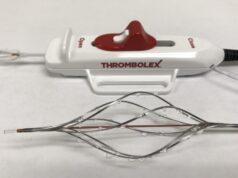 Bio2 Medical has announced the results of the Angel Catheter pivotal study published in the Journal of Vascular and Interventional Radiology. The Angel Catheter met all safety endpoints and demonstrated a significant reduction in clinically significant and fatal pulmonary embolism (PE).
Bio2 Medical has announced the results of the Angel Catheter pivotal study published in the Journal of Vascular and Interventional Radiology. The Angel Catheter met all safety endpoints and demonstrated a significant reduction in clinically significant and fatal pulmonary embolism (PE).
The novel device was tested in a single arm, multicentre clinical trial in which it was inserted bedside in the intensive care unit (ICU) without fluoroscopy, and safely retrieved from all patients prior to discharge. The study included 163 critically ill patients with high risk of acute PE and contraindications to anticoagulation, with 151 (93%) critical trauma patients. In this trauma group, 129 (85%) patients suffered from spinal or head trauma, 102 (79%) of which also had intracranial bleeding. With no catheter-related blood stream infections (CRBSI), the Angel Catheter successfully averted PEs in 14 (11%) of the 129 patients with a pre-removal cavogram.
Victor F Tapson, the primary investigator from Cedars-Sinai Medical Center, Los Angeles, USA, stated, “This study of a combined IVC filter/central venous catheter was the culmination of a panel of dedicated investigators with careful guidance by the FDA. The efficacy and safety of the device, simple bedside placement, and the need to remove it before discharge make it very appealing. Nearly the entire cohort had crucial, yet short-term filter needs so that discharge without a filter was preferred.”
Bio2 Medical says that the Angel Catheter is the first medical device cleared by the FDA for PE prophylaxis in critically ill patients contraindicated to anticoagulation.
The trial was conducted in 20 ICUs across the USA with the treatment beginning at device insertion and ending 72 hours after the removal. Patients were evaluated daily for PE, lower extremity deep vein thrombosis (DVT), CRBSI, and major bleeding. The primary endpoint was freedom from clinically significant PE or fatal PE at the time of hospital discharge and 72 hours after removal of the Angel Catheter. Secondary endpoints were acute proximal DVT, CRBSI, major bleeding events, and averted PEs.
All the devices were placed and retrieved without incident. None of the patients experienced clinically-significant PE or fatal PE. Of the 129 patients who had a pre-removal cavogram, 31 (24%) had thrombus within the filter, 14 (11%) of which were averted significant PEs. Twelve (86%) of the 14 underwent anticoagulation for an average of 4.1 days, five of whom also had a traditional IVC filter placed. Additionally, there were zero catheter related bloodstream infections in over 1,170 catheter days.
Christopher Banas, chief executive officer of Bio2 Medical, stated, “The publication of the results of the Angel Catheter pivotal study represents an opportunity to create awareness and further the goal of making this unique, lifesaving product available to the American public. Working collaboratively with the FDA as an initial participant in the FDA’s new Early Feasibility Study Program enabled Bio2 Medical to develop a clinical protocol which contributed to the pivotal study being completed nine months ahead of schedule due to its fast enrolment. Congratulations to the primary investigators, whose support was a major factor in the study’s success.”
Through the pivotal study, the Angel Catheter demonstrated its effectiveness in reducing PE. Furthermore, the Angel Catheter generates financial savings to hospitals by reducing the costs associated with PE, the cost of complicated IVC filter removal, and the cost of IR suite time. The device has now clinically demonstrated its ability to avert PEs in high-risk patients by providing immediate PE prophylaxis. The Angel Catheter is commercially available in the USA and EU.









